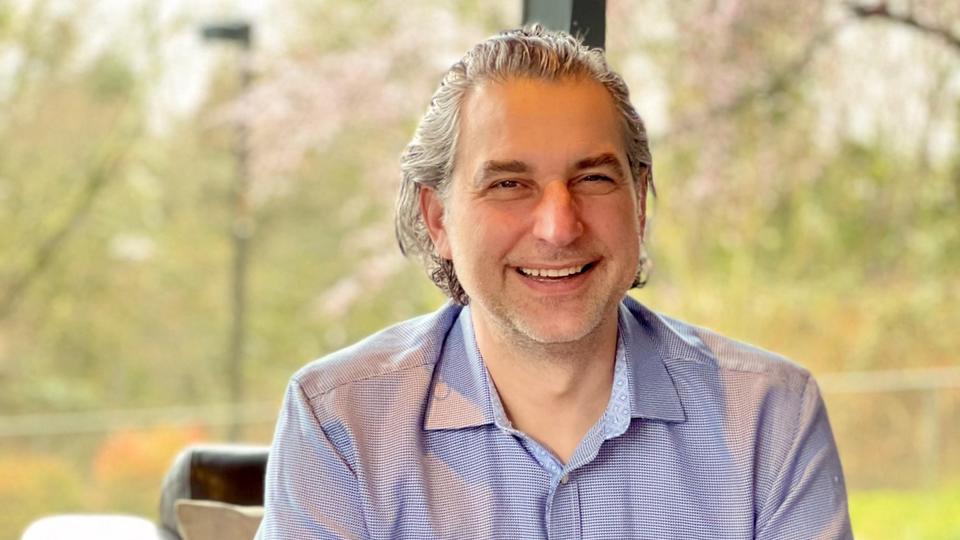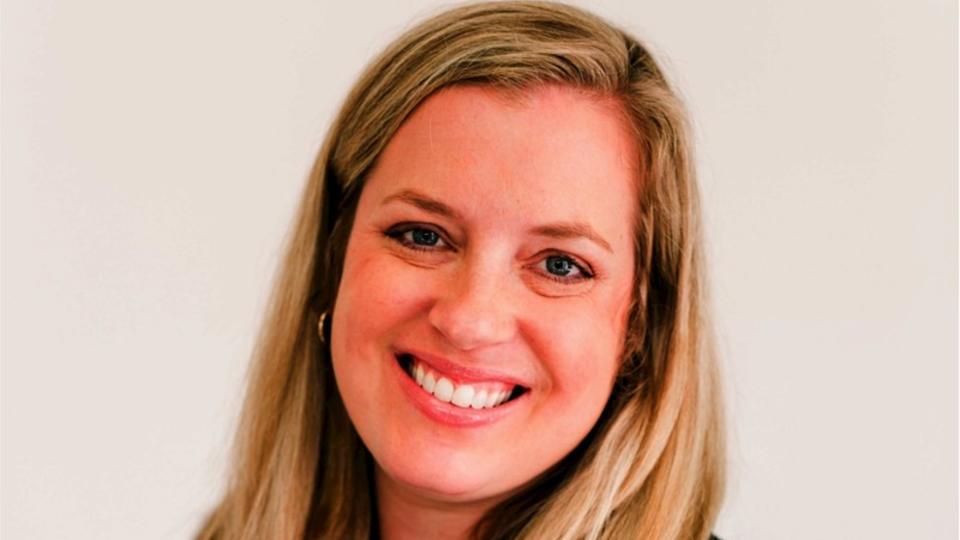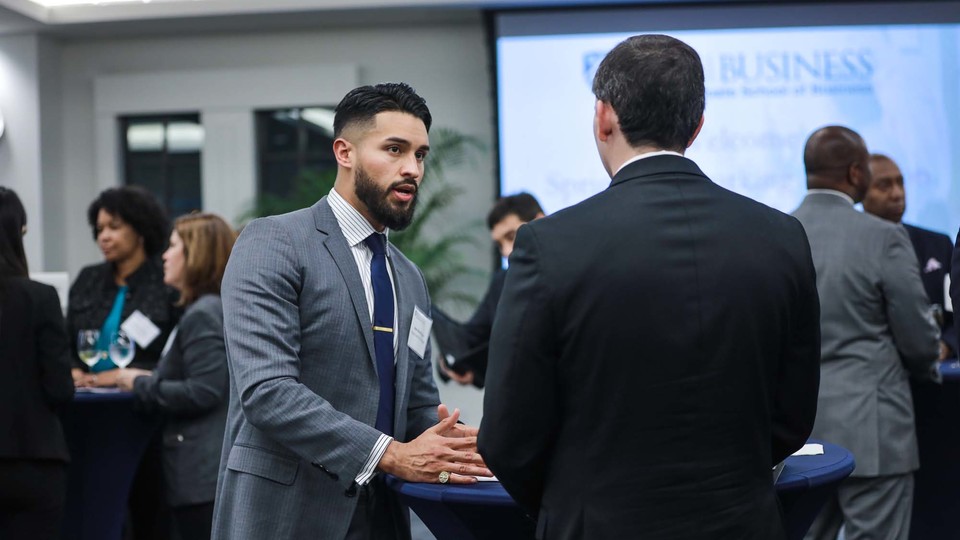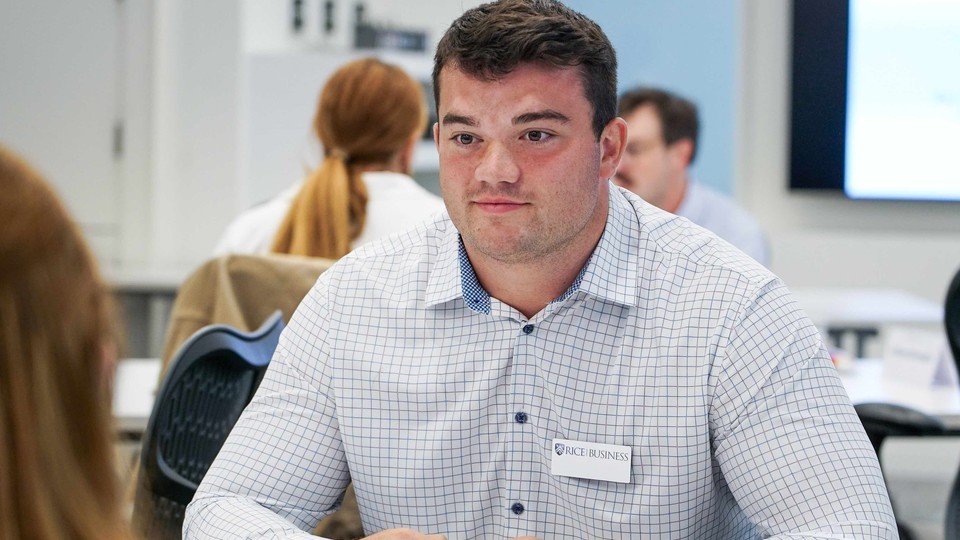Rice Business mourns loss of Bill Arnold
William “Bill” Arnold, a popular professor in the practice of energy management at Rice’s Jones Graduate School of Business, died Aug. 5 after a battle with gallbladder cancer. He was 75.
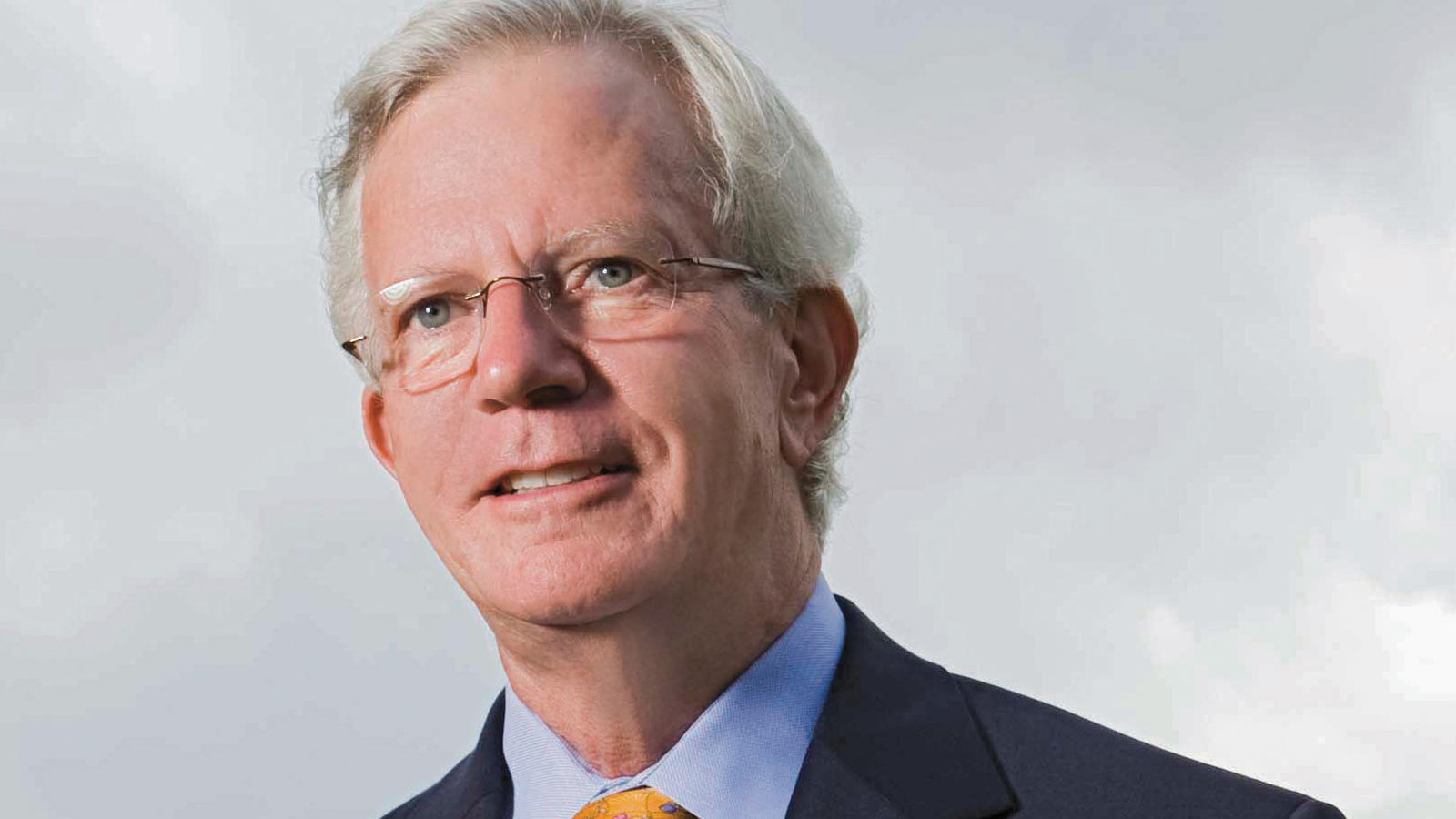
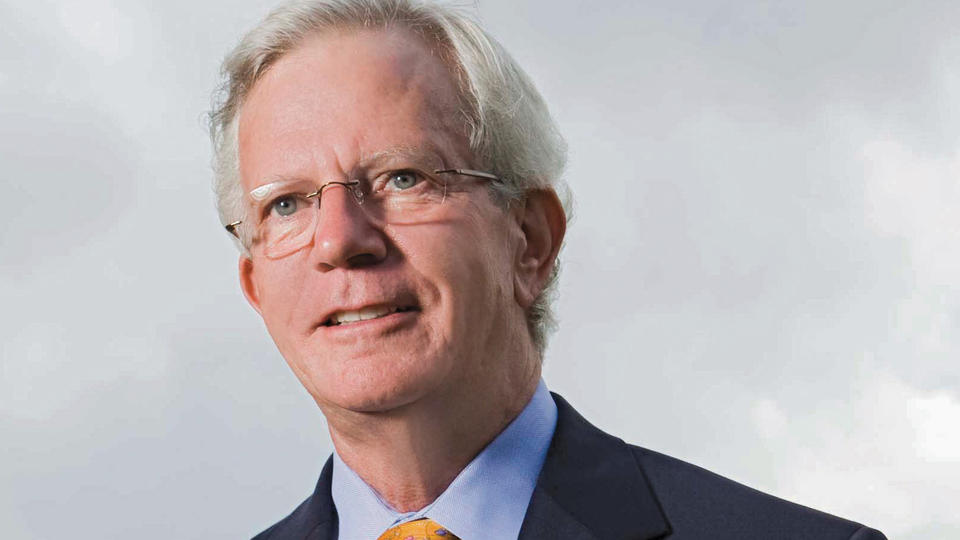
William “Bill” Arnold, a popular professor in the practice of energy management at Rice’s Jones Graduate School of Business, died Aug. 5 after a battle with gallbladder cancer. He was 75.
Born Oct. 15, 1944, in Woonsocket, Rhode Island — “a textile mill town with a diverse ethnic background that triggered his curiosity about the world,” according to his obituary in the Houston Chronicle — Arnold joined Rice in 2009 following careers in banking, government and energy.
“Anyone who knew Bill immediately felt his warmth, good humor and genuine interest in others,” Rice Business Dean Peter Rodriguez wrote in a message to the school community. “Bill loved his students, loved teaching and Rice, and it always showed. He was a bright presence at Rice Business. I believe he received true joy from teaching the (courses) Geopolitics of Energy, Energy Transitions, Entrepreneurship in International Energy and especially his international energy simulation, which was a wonderful and innovative learning experience.”
One often found Arnold at a table full of students in the Faculty Club lingering over a long lunch, strategizing job prospects or the broader context of current events, Rodriguez recounted. He was also an avid photographer and enjoyed capturing the Rice rugby team, Beer Bike, Rice Business’ Investiture graduation ceremony and Partio parties on McNair Hall’s patio. He had an unfinished novel in his desk drawer and an active Facebook page with pictures of his wife, daughter and grandchildren and natural wonders — birds, bugs, flowers and weather.
“Bill’s professional resume is broad and impressive,” Rodriguez wrote. “While his impact has been deep across the Rice campus, it is the 1,600 students he taught at the business school and his colleagues throughout his career who will remember him most fondly. We are grateful to have had his vibrant spirit for part of that time, and we miss him greatly.”
Arnold, who was Royal Dutch Shell’s Washington, D.C.-based director of international government relations and senior counsel for the Middle East, Latin America and North Africa for 16 years, was a sought-after expert by media on energy industry issues.
“Houston has been the world energy capital for decades because of its concentration of technical, financial and managerial talent,” he wrote in a 2018 op-ed for the Houston Chronicle. “That will be challenged on many fronts, and policymakers and business leaders need to keep a long view of what it will take to strengthen the Houston economy for the next generation of those wanting to earn a high wage, too.”
Arnold is survived by his wife of 49 years, Catherine Anthony Arnold; and daughter Elizabeth Kendall Arnold Dennis and her husband, Richard Hollis Dennis III, and their children Cate, William and Ellen, of Rye, New York.
Houston: How We’re Doing
One year after one of the worst storms in U.S. history, The New York Times reports, “progress in Texas is unevenly distributed.”


A conversation with Peter Rodriguez, Abbey Hartgrove and Barrett Moorhouse
One year after one of the worst storms in U.S. history, The New York Times reports, “progress in Texas is unevenly distributed.” Mimi Swartz, an executive editor at Texas Monthly, also wrote in a piece for the Times, “Maybe a year isn’t enough time to make sure that everyone in need gets a FEMA check and that their homes are mold free. It’s probably not enough time for Houston to reimagine itself, either.” But we’re trying. The following is an excerpted conversation with Peter Rodriguez, Abbey Hartgrove and Barrett Moorhouse.
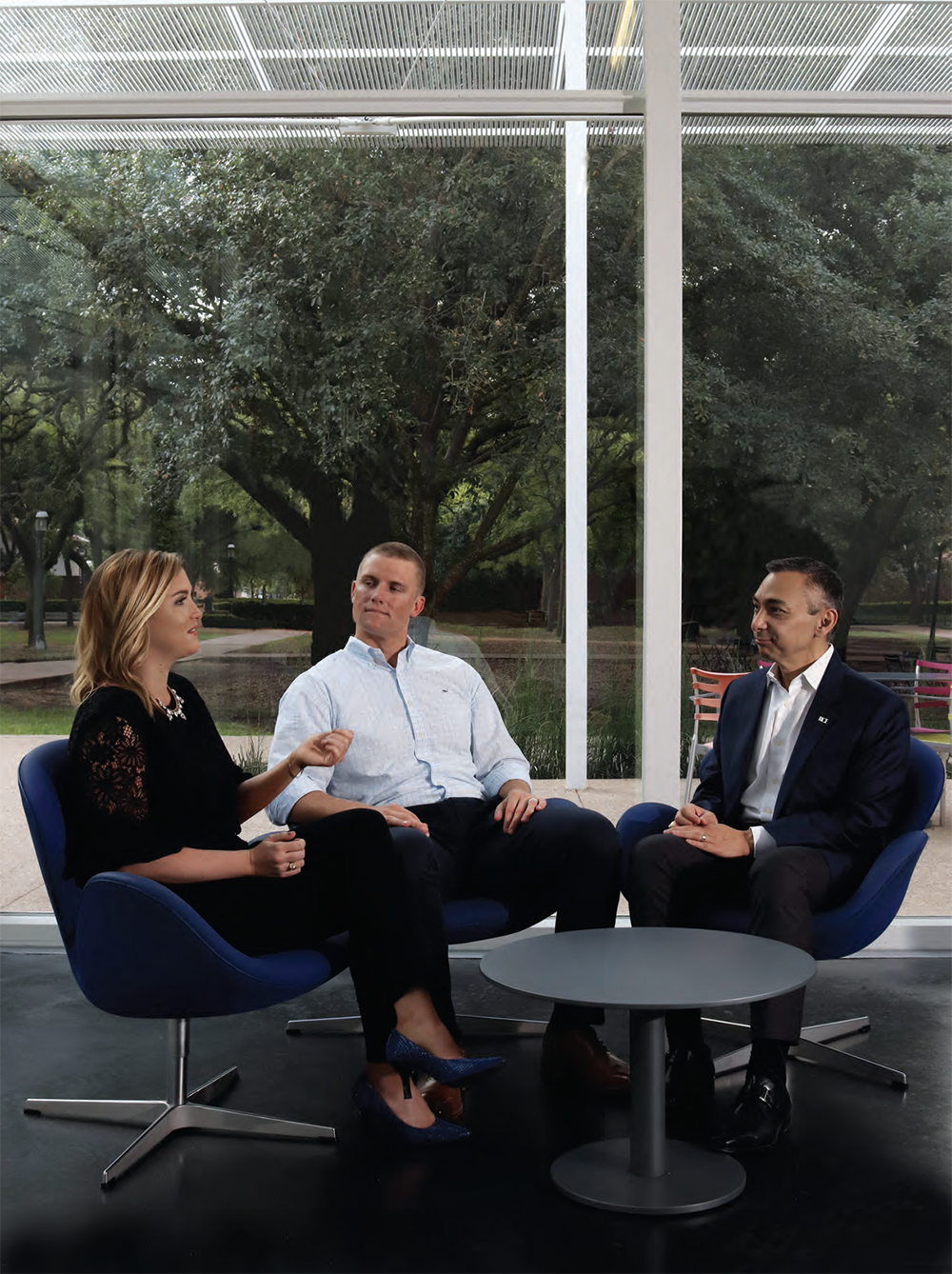 Peter Rodriguez, Dean
Peter Rodriguez, Dean
Where are we as a school one year after Hurricane Harvey?
Remarkably I would say we are exactly where I would’ve expected us to be. We’ve learned about ourselves as a community. We care about each other beyond the work we do together. To look around the school you would not be able to tell we had that calamity a year ago. We’ve launched a new MBA program. We completed a year of classes. We went on global trips. Business as usual.
What did Hurricane Harvey tell you about the fabric of this place?
It reminded that we had leaders everywhere. People didn’t need or wait for direction. They knew how to act and what to do. All at once, everyone was working to lift up everyone. That’s the biggest surprise about the disaster. We were able to reach everyone so quickly through the networks we formed, even among people who had just arrived.
What have you learned personally and professionally in the year since the storm?
Personally, I think it’s a lesson in humility. We learned how vulnerable we are. You can be made nearly helpless. Acknowledging that and preparing is something we need to do upfront. Professionally you learn — there’s a great quote by Eisenhower — “plans are useless but planning is essential.” Mostly what he meant is that you never know what’s going to happen, but you have to contemplate before something occurs and get everyone aligned behind common objectives. And he meant it’s your best defense. With all of this, still the message is that despite our general recovery as an institution we know that Harvey had permanent effects. So many are still recovering.
Abbey Hartgrove, Associate Director, Global Programs
Your house flooded three times in three years. What was different about the flood with Hurricane Harvey?
With each flood came its own unique challenges and difficulties that make them hard to compare. The extreme impact that Harvey had on the majority of the Houston community brought a level of awareness that did not exist before. The support I had during Harvey went beyond my closest friends and family. I think it also illuminated what families who have flooded before have gone through, and how devastating it was that it was happening again, especially for those who thought things were getting back to normal. The awareness brought a powerful call to action that this city has needed for many years now.
What have you learned about the people that make up Rice Business?
Rice Business is home to my professional life. It hasn’t always been obvious to me that it plays a huge role in my life outside of McNair Hall. This community is part of my family and houses many of my closest friends. It was made very clear during this tragedy that this group of people is special. We have people who truly care about others and want to make a positive difference in lives other than their own. Harvey truly brought deeper meaning to “best and brightest,” a phrase we attribute to those associated with Rice Business.
What did you learn about yourself that you didn’t know before?
The sad truth of the matter is that you don’t always know how important something is to you until it’s gone. With the loss of so many items that meant the world to me, it became very clear that I had a number of sentimental objects that I never thought I wouldn’t have for a lifetime. You are reminded that ultimately things are only things, but also that items that are connected to a memory are precious and irreplaceable. In the end, I was reminded how important it is to surround yourself with people who will support you not only in the best of times but especially in the darkest of times. You learn that it’s okay to be sad, it’s okay to feel that loss, it’s okay to even sometimes feel defeated — but ultimately you learn that even when you feel at your lowest, you are capable of exceeding the highest expectations of yourself.
Barrett Moorhouse, Full-Time MBA 2019, Marine Corps veteran, IREP award recipient, VIBA president
You were less than a month into the school year when Hurricane Harvey hit. What happened?
After helping my mom’s friend rip sheetrock out of her flooded house, I pulled up to a stoplight and saw a guy with a truck and a boat. I said, Can I come along? He said, Sure. For about a day and a half we went house to house all over Houston and Friendswood rescuing people in this guy’s 18’ boat. We tore up that boat pretty good. I see another group doing the same thing in an apartment building off I-10. The DEA, National Guard and Sheriff are helping. I walked up to see what was going on and these two junior National Guard told me they were gathering intelligence. I told them I’d been a captain in the Marine Corps. I had some mapping software on my phone and showed them how to use it, and they talked to the sheriff. The sheriff said, hey man will you run this? The National Guard guys came up and handed me a cell phone with their supervisor on the line. He said he had a couple of trucks and humvees and asked if I could put them to use. I said yes. I do really well in these kinds of emergency situations. I really enjoyed being able to contribute in Harvey. [Barrett went on for two and a half days, leading a crew of soldiers from the Texas National Guard. Using the Texas Navy Facebook page — set up by civilians with boats — they staged the North Star Mall with a convoy of trucks and boats then coordinated with the Texas Navy to rescue stranded families and bus them to the nearest shelters. He slept on the truck, ate MREs and remarked that it felt like being back in the military.]
How did people at school find out?
I didn’t tell anyone. I was on CNN and my mom saw it and told a lot of people. As for school, there was this Rice professor and his wife who were stranded in their car. I helped get them to safety and he found out I was military and told Drew Sims ’18. I think he was the one who told people.
What did you learn about yourself that you didn’t know before?
I realized, looking back a year later, that I missed service in some form or fashion and wasn’t sure how to make that happen in my civilian life. That’s when I decided to take a leap of faith and commission with the Coast Guard Reserve. After graduation, I’ll train for a month in New London, Connecticut. In the event of another Harvey, I can request to be activated. It’s something that’s really important to me.
Keep Exploring
Pitching It Forward
A launching pad for innovative companies across industries — technology, energy and life sciences.
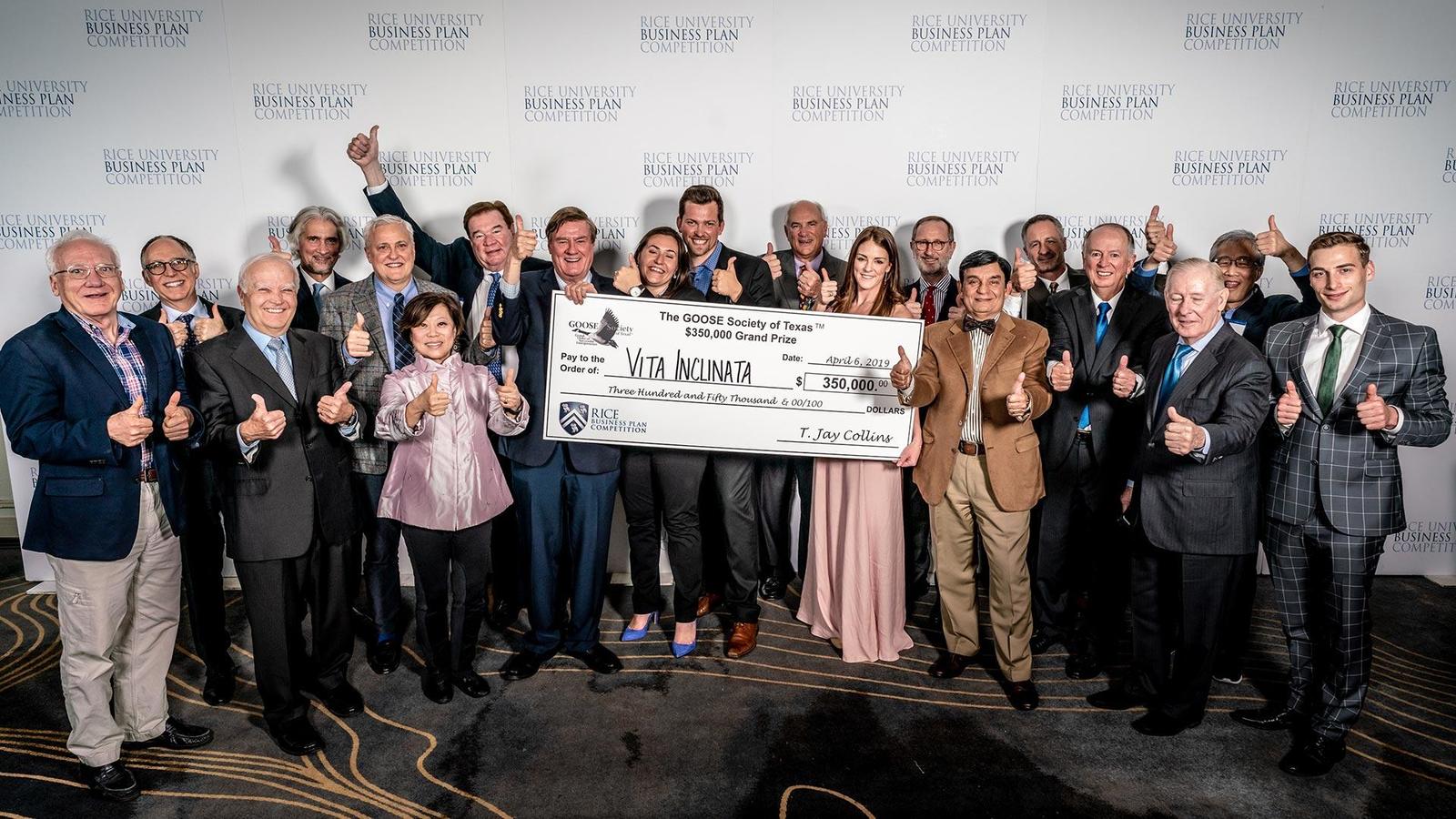
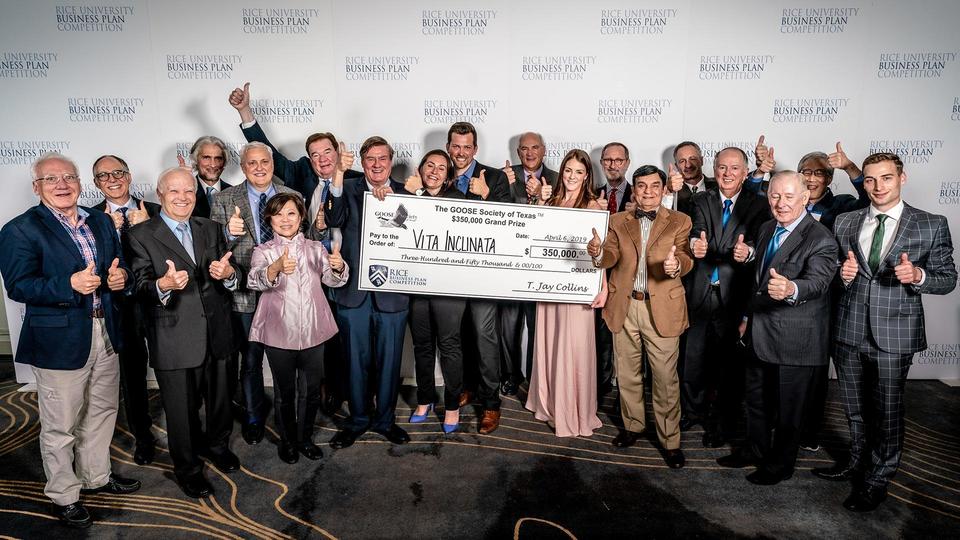
In the Shell Auditorium, Randy Paris steps up to the podium to present his pitch. A hush falls over the crowd as hundreds of angel investors and venture capitalists train their eyes on the University of Chicago Booth MBA, who has 15 minutes to make his business case.
Paris, CEO of coffee startup BrewBike, and his team have made it to the final round of the 19th annual Rice Business Plan Competition (RBPC), the world’s richest and largest student startup competition.
Alongside 41 other teams from across the globe, for three days Paris and his team have vied for what was ultimately a record $2.9 million in prize money to invest in their growing businesses. The stakes are huge.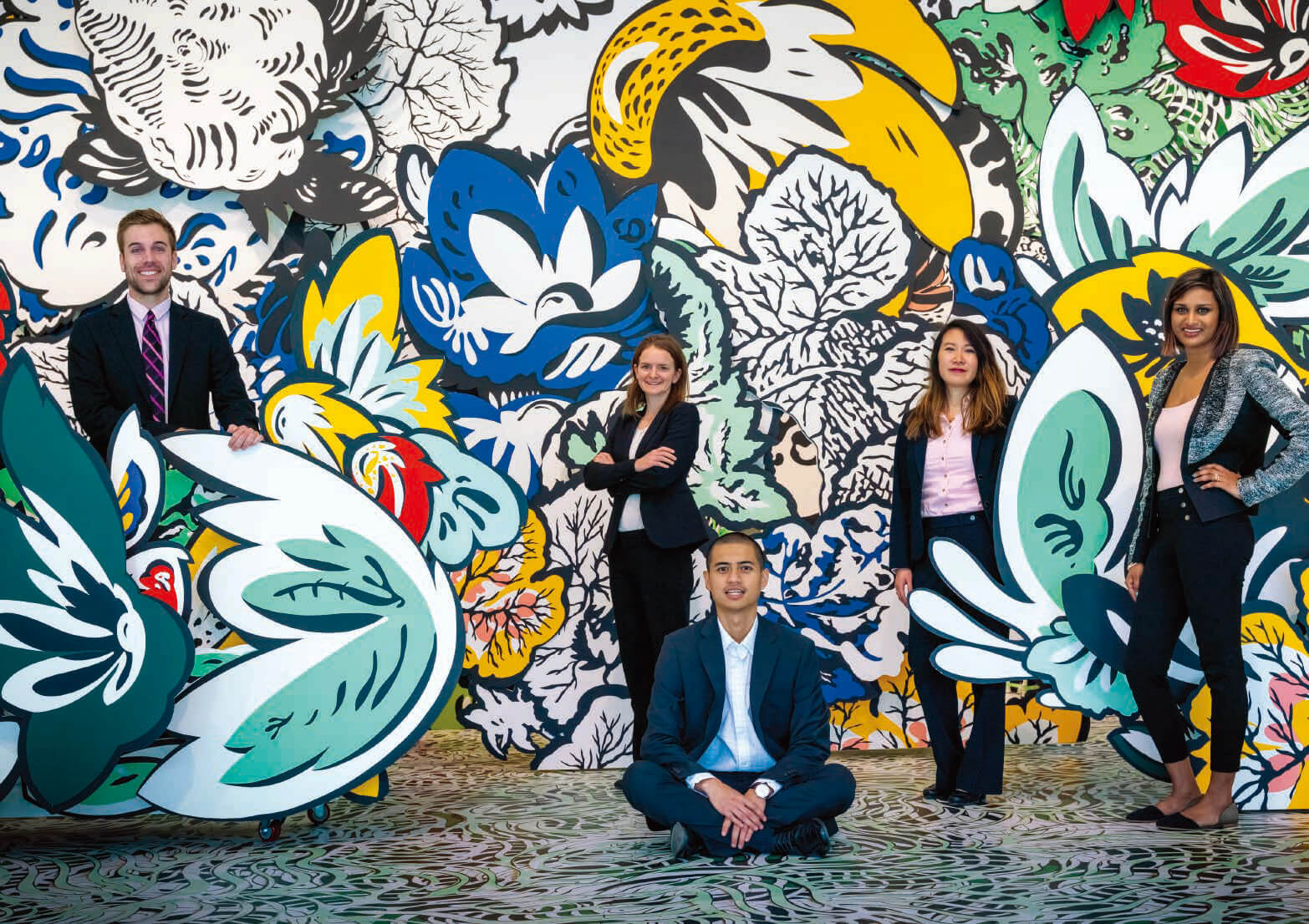
“You can only keep driving if you have gas in the tank,” says Paris before the competition kicks off.
His team of four includes BrewBike founder Lucas Philips from Northwestern University. The company delivers cold brew coffee in a more convenient way to students at Northwestern and UT Austin through a business model that’s 100% student run. Their goal is to expand to dozens more universities across the U.S.
After closing an $850,000 seed round in September, BrewBike applied to RBPC to further fuel its expansion.
“Getting ready for a competition like Rice is such a valuable exercise in and of itself,” Paris says. “You’re making the case for why your company makes sense. And once you’ve convinced yourself, you can convince investors.”
Paris and Philips were among an impressive group of teams at RBPC this year, from the U.S. to the U.K. to Singapore. The event is hosted by the Rice Alliance for Technology and Entrepreneurship and the Jones Graduate School of Business.
With enthusiasm, props and catchy slogans, teams presented their business solutions to some of the world’s most pressing issues — heart disease, cancer, student loans, clean drinking water and immigration.
For months leading up to the event, they worked on refining their financials, their sales and marketing plans, and their exit strategy.
This year’s team from Rice, LilySpec, has set out to overhaul the vaginal speculum, making the OB/GYN experience a more comfortable one for women.
During pitches at RBPC, Rice MBA student Joanna Nathan waved a metal speculum through the air.
“This device has been torturing women for the past 150 years,” Nathan tells judges, all volunteers, as she opens the device. “It’s in serious need of an innovative, patient-centered overhaul.”
LilySpec took home $29,000 in prizes, and won best elevator pitch. Personal experience influenced other teams’ products as well.
NABACO from Texas State University applied to RBPC to help raise $500,000 for its Natuwrap coating, a spray that extends the shelf-life of fruits and vegetables. NABACO COO Damilola Runsewe grew up in Nigeria, where food traveling long distances often spoils.
“The level of the competition here is absolutely world-class,” Runsewe says. “Just being here is stimulating. The hardest part was seeing it come to an end.”
Caleb Carr, CEO of Vita Inclinata Technologies from the Mitchell Hamline School of Law, developed the Load Stability System (LSS) after his search and rescue teammate Don died from a heart attack following an unsuccessful airlift.
The LSS prevents the wild swing of precious passengers and cargo as they’re being airlifted during helicopter operations.
“We know what our mission is,” says Carr, who was finally accepted into RBPC this year after four unsuccessful applications. “It’s to ensure people won’t die because of the swinging. Every time I go on stage, I’m focused on that life-saving aspect.”
The best 42 minutes in capitalism
A launching pad for innovative companies across industries — technology, energy and life sciences — RBPC provides participants with invaluable feedback to hone their pitches and ultimately attempt to launch their businesses.
In a given year, more than 300 teams apply for the 42 spots.
In classrooms, over box lunches and in the hallways, teams get ample opportunity to network with investors. Business cards are exchanged, meetings are scheduled.
The competition kicks off Thursday afternoon with a practice round before the rapid-fire Elevator Competition in the Shell Auditorium.
“They say the Kentucky Derby is the best two minutes in sports,” Rice Business Dean Peter Rodriguez tells students as they gear up to deliver their 60-second elevator pitch. “Well, this is the best 42 minutes in capitalism.”
On Friday, teams split into seven tracks, present to judges, then address questions during a Q&A.
One crowd favorite, Resonado, played the song “Englishman in New York” by Sting for the judges after the team’s slide presentation.
“Join us in replacing all the speakers in the world,” CEO Brian Cho told the judges, holding up the flat core speaker he and his father developed.
“It’s almost like a final exam,” says Paris, who handed out cups of cold brew coffee before BrewBike’s pitch. “You can get a question about anything in the textbook. You have to be prepared.”
Friday afternoon, each team receives 15 minutes of feedback.
At an evening reception, the 15 semi-finalists are announced — the top two from each track, plus the highest-scoring third place team.
Saturday morning, semi-finalists compete across three tracks, delivering their pitches yet again. The remaining 27 teams compete in a Wildcard Round for a spot in the finals.
At noon on Saturday, in a standing-room only Shell Auditorium, the finalists are announced. Then teams have one last chance to convince the critics before the winners are revealed Saturday night at a company showcase and banquet.
Supporting entrepreneurs
The GOOSE Society of Texas provides RBPC’s top, $350,000 prize, and often upsizes it. The winner is invited to pitch to the entire GOOSE group, a meeting that many times results in millions more in funding.
GOOSE has invested more than $20,000,000 in a dozen RBPC companies, more than 40 percent of its total capital invested. Four companies have exited, returning more capital than GOOSE initially invested.
GOOSE co-founder Jack Gill, founder of the Palo Alto-based Vanguard Ventures, has judged at RBPC since 2005.
“I love to support entrepreneurs at the core level,” says Gill. “RBPC is like the Super Bowl. Prizes are big, the competition is tough, and the process is very intense. My favorite part is meeting all these dynamic entrepreneurs, the fun, the excitement when you see all that energy and aspiration in the room.”
"The Rice competition changed our lives. We refer to our company as pre-Rice and post-Rice. The competition sent a message that we can build something really big; it gave us even more confidence. It’s something we’ll never forget.”
In addition to GOOSE, more than 200 other corporate and private sponsors support RBPC. Even teams that don’t make it to the finals have the potential to walk away with hundreds of thousands of dollars in prize money.
For judges, RBPC is not only an investment opportunity, but also a chance to reconnect in person with colleagues from across the world. Of the 300 judges this year, more than 26 percent were women, up from six percent in 2001.
“We’re on our way to 50 percent,” says Rice Alliance Managing Director Brad Burke, who served as the competition’s host and emcee.
CISCO, which sponsors the $100,000 CISCO Global Problem Solver Prize, first partnered with RBPC in 2016. This year it sent seven judges to the competition.
“Venture capital is an area that’s underinvested,” says Mary de Wysocki, senior director with corporate affairs at CISCO. “We were evaluating incubators globally, and one that rose to the top was Rice. I always feel the pool of talent is really high.”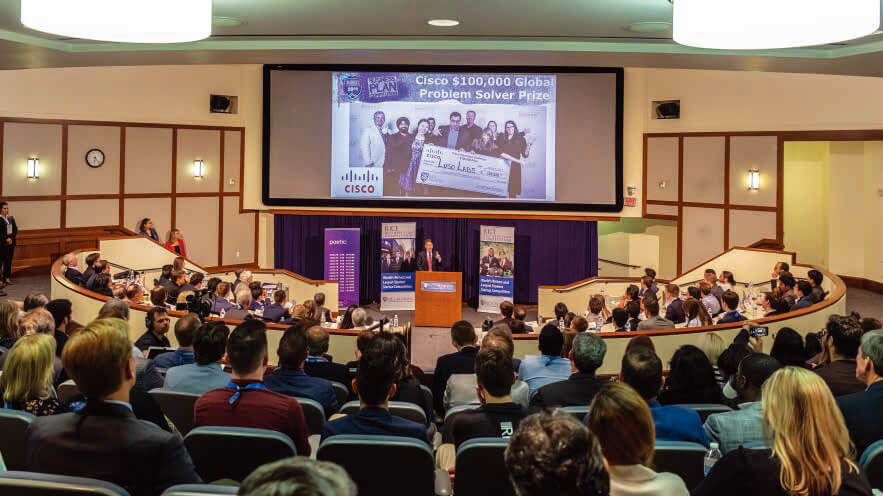
This year, CISCO awarded its prize to Rhaeos, a Northwestern University team that’s developed a wearable sensor to help better monitor patients with hydrocephalus, a condition where excess fluids builds up in the brain.
In 2016, CISCO chose Neopenda from Columbia University, which makes sensors to monitor newborns. Last year, de Wysocki visited Neopenda’s trial in Uganda. “It was life changing,” she says. “Young people care, and you see it in action in some of these startups.”
Diana Murakhovskaya, principal and co-founder of the recently-launched The Artemis Fund, Houston’s first, female-focused fund, says Houston is the place to be for founders. “It was great to see so many companies with female leadership,” Murakhovskaya says.
This year’s $100,000 Artemis Investment Prize went to Zilper Trenchless from the MIT Sloan School of Management, which is working to reduce the cost of infrastructure by developing new technologies related to water pipeline construction.
Changing lives
Since 2001, when nine teams competed for just $10,000, RBPC has seen more than 229 competitors successfully launch their ventures. Past competitors have raised nearly $2.3 billion in funding and created more than 3,000 new jobs. Thirty-two companies have seen successful exits valued at more than $1 billion.
“The competition helped us get that initial leadership and funding together,” says Emma Fauss, CEO of Medical Informatics Corp, Rice’s 2013 team. “Going out into the world, we felt we could answer any question.”
Fauss’ company develops technology to help clinicians focus more on patients and less on documentation. Her team didn’t place at RBPC, but they still walked away with $28,500 in prize money. Days before this year’s competition, Medical Informatics announced it had raised $11.9 million in Series A funding.
Samir Mayekar, CEO of Nanograf, a battery technology company, won RBPC in 2013 when he was an MBA student at Northwestern. His team took home $911,000, which grew to over $1 million in the months following the competition.
The company has expanded from three students when Mayekar competed at RBPC to now more than 20 employees across three continents. Nanograf is working with Ford, GM and Chrysler, and it’s on the cusp of commercialization.
“The Rice competition changed our lives,” says Mayekar, who still has the giant foam check they received tacked up on the wall in his office. “We refer to our company as pre-Rice and post- Rice. The competition sent a message that we can build something really big, it gave us even more confidence. It’s something we’ll never forget.”
A transformative experience
Saturday night at the Westin Galleria, investors chat with teams as they browse their tables at the Company Showcase. Later, in the ballroom, Houston-based street artist Dual puts the finishing touches on an original piece of art he’s created for, and during, the competition.
The 2019 finalists — running on fumes — huddle on stage. An excited chatter spreads across the room as the winners are announced. In fourth place, Rhaeos ends up with more than $450,000 in prizes. Fifth place winner Zilper Trenchless takes home $435,000, and BrewBike takes sixth, bringing home $100,000.
“This experience was one of the most exhilarating I’ve ever undertaken,” Paris says.
GOOSE upsized its prize once again this year, handing out an additional $925,000 spread across five teams. The OWL Investment Group also upped its prize money and handed out $400,000.
Resonado and Vita Inclinata stand side by side as the second-to-last envelope is ripped opened. Cheers erupt across the ballroom.
Resonado takes second place, earning $425,000 in prizes. Vita Inclinata is the first prize RBPC 2019 winner, walking away with over $550,000 in cash and prizes, including the chance to ring the closing bell at the NASDAQ in New York.
“Winning Rice was not only a great catalyst, but also a great validation for our technology,” says Carr. “You can literally transform your business over three days. Rice is very much catapulting our opportunities.”
Deborah Lynn Blumberg is a Houston-based freelance writer specializing in business, finance and health and wellness whose work has appeared in publications including The Wall Street Journal, MarketWatch, The Christian Science Monitor and Newsday. Previously, she was a reporter at Dow Jones/The Wall Street Journal. (deborahlynnblumberg. com; @dlblumberg)
You May Also Like
Keep Exploring
Igniting a Passion
The IGNITE 2019 conference for entrepreneurs
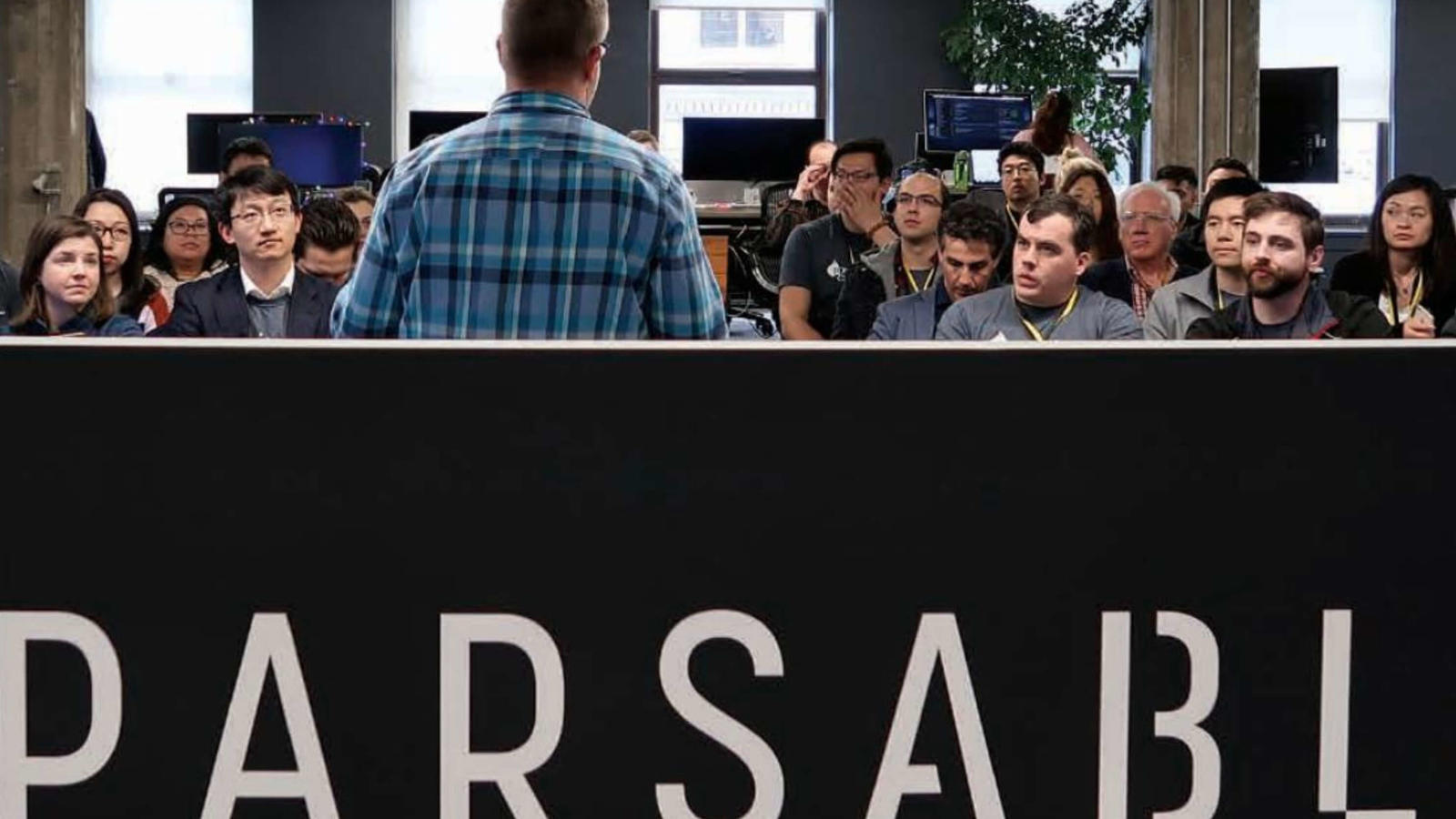
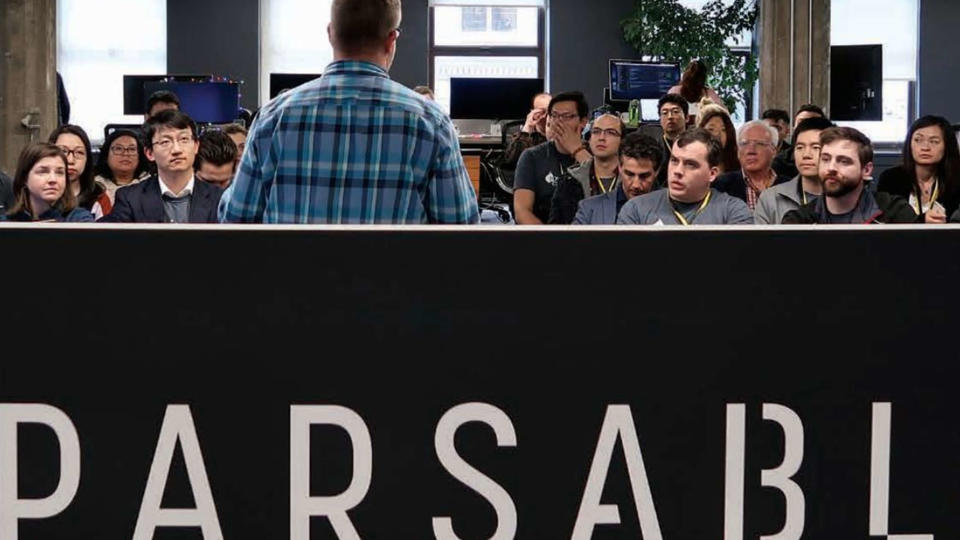
"Two years ago, our speaker was sitting in your chair. Please welcome Dr. Brittany Barreto."
With those words, Jack Gill — scientist, professor, venture capitalist and philanthropist — introduced the first speaker for the IGNITE 2019 conference for entrepreneurs. In the audience sat seasoned entrepreneurs, generous conference sponsors and students interested in learning about how to create and build high-tech entrepreneurial companies.
Ph.D. students and medical doctors from Rice, UC-Davis, Baylor College of Medicine and the Texas Medical Center Innovation Institute had technical knowhow in computer science, biology, chemistry, physics and medicine to develop technologies. MBA students from Rice, UC-Davis and Lamar had the know-how to monetize and commercialize them.
After spending the previous day visiting startups in the Silicon Valley, everyone had gathered at UC- Davis to listen to a long line-up of entrepreneurs talk about their experiences when taking ideas to market. Barreto kicked it off, describing being a genetics Ph.D. student at Baylor College of Medicine, feeling she hadn’t yet arrived at what she wanted to do, but knowing it was an important stop along the way. She worked countless hours in the lab to advance her professional career and was dating to grow roots in her personal life. Then one day, under the hood in the lab mixing chemicals, she thought, why not use the science I know to create a dating app?
She found a friend who could build the app, gathered a team and started to hustle — sharing her idea with different audiences, beta testing it with consumers and finding investors. Pheramor came into creation. Today, it’s a dating app that matches people using physical chemistry and social alignment. And Barreto has moved from conference participant to lead-off speaker.
She also set the perfect tone. While not sparing the challenges with which she grappled both from entrepreneurial and personal viewpoints, she encouraged the audience to pursue ambitions, making everyone there believe that he or she, too, could be standing at the front of the room, telling everyone about his or her success story.
Over the next two days, entrepreneur after entrepreneur stood at the front of the room, recounting his or her story. Nicholas Seet had created and commercialized audio technology acquired by Adobe. Sally Edwards, an Olympic athlete and founder of the running store Fleet Feet, talked about her new app, Heart Zones. Ben Lyon, a lawyer, talked about his improbable entrepreneurial journey that at one point landed him in Russia in the 1990s. Today, he is working with IMMiX BioPharma to develop and bring novel cancer therapies into practice.
Two speakers, Brad Chisum and Mark Randall, touched on their next phases of entrepreneurship, which actively support the next generation of entrepreneurs. Chisum, CEO of Launch Factory, has created this company to incubate new start-ups. Randall, retired VP of Creativity at Adobe, is now taking his well-known Adobe Kickbox innovation process to a broader audience through foundation work.
Like Barreto, each narrated his or her entrepreneurial journey through a chronological lens that brought technical, business and personal successes and challenges into view. Everyone described different leadership styles, as well as strategies and techniques for developing companies. Their organizational techniques, skills and capabilities also differed. Yet they all shared common attributes — one being key connections to Rice, UC-Davis or Lamar that helped propel them to success. Some had, in fact, participated in the Rice Business Plan Competition.
While entrepreneurship isn’t for the meek, the personal and professional rewards can be phenomenally worthwhile. As they left the conference hall, amused smiles spread across audience members’ faces, as collegial small talk broached the question: Who from this audience might find himself or herself at the front of this room, speaking, in a few years?
Rosalee Maffitt is a 2020 MBA candidate at Rice Business.
You May Also Like
Keep Exploring
Valuation
It all boils down to this conundrum: Is valuation a science, with well-defined steps and consistent processes? Siddharth Sen ’09 explains.


"What was the commodity price you used for your valuation?"
"I think our valuation is wrong,” I announced breathlessly.
How else to explain the different metrics from my model compared to a press release on the acquisition of an upstream oil asset in the Rocky Mountains?
A recent hire, I had rushed into my manager’s office to explain my concern. Before sharing my panic, he asked some questions.
“What was the commodity price you used for your valuation?” Then, “What was the acreage position?” And, “Is the oil production curve you used the same as the one used by the companies that bought and sold the asset?”
And many more. Slowly, but surely, it dawned on me. My valuation model wasn’t wrong.
It was just different!
Time and again, I’ve had to face similar situations. A comment I hear often — mostly from those who don’t work directly on asset valuations — is, “This analysis is completely incorrect.” I’ve also found that most of the time there’s a logical explanation for differences. Most analyses can be validated. So why are these comments so prevalent?
It all boils down to this conundrum: Is valuation a science, with well-defined steps and consistent processes? Or is it an art, reflecting the insights and choices a skilled analyst brings to bear?
To analyze an upstream, onshore, oil-producing asset, I need a set of facts, including acreage position and capital to be invested. These facts become part of the set structure within the valuation models. Then I have to build out the asset development plans and estimate costs. These inputs are assumptions, and may be challenged.
Imagine the number of factors involved in a single metric: such as commodity prices. A commodity price analyst, frustrated by market volatility, might say, “Over the past several quarters, we have not been able to come up with a forecast that has reflected actual price movements, even though we have spent countless hours analyzing it.” This ambiguity can be driven by multiple factors, all the way from the economic health of the country down to the individual user at the pump. And this is just one of the assumptions used in an asset valuation model.
Recently, the valuation for one of our assets was on the lower side of that provided in the asset deal announcement. We double-checked the analysis. The facts were accurate. Assumptions on metrics, such as cost estimates, were in place as well. By simply making our forecast more aggressive, we found that we could match the valuations provided in the deal announcement.
“I think our valuation model is wrong, and I don’t know why,” my newest team member told me. He had followed the steps exactly as he’d learned them. His inputs were complete. He had gone over the process in his mind multiple times and was distressed that it was not giving him the results he wanted.
Smiling to myself, I asked him, “What was the commodity price you used for your valuation?”
Siddhartha Sen is a 2009 Jones Graduate School of Business alumnus currently working at IHS Markit. He has more than 10 years of asset valuation experience.
Keep Exploring
2nd Act
F. Scott Fitzgerald was wrong. There are second acts in American lives — and third and fourth acts, too.


F. Scott Fitzgerald was wrong. There are second acts in American lives — and third and fourth acts, too. Increasing numbers of workers are bowing out of Act I to pursue careers that offer more fulfillment and a greater sense of well-being.
 In her role as a senior financial analyst at a large retail company, LaTisha Cotto MBA ’14 would crunch numbers from sunrise to sunset. She ate lunch at her desk, usually fast food. Work often spilled over into the weekends, but she didn’t complain. After all, she was taking home a six-figure salary and she liked the prestige of her role.
In her role as a senior financial analyst at a large retail company, LaTisha Cotto MBA ’14 would crunch numbers from sunrise to sunset. She ate lunch at her desk, usually fast food. Work often spilled over into the weekends, but she didn’t complain. After all, she was taking home a six-figure salary and she liked the prestige of her role.
Once, when Cotto ran herself ragged and came down with bronchitis, she still went in to work. It was end of quarter and, her boss said, “all hands on deck.” Then, Cotto started having serious stomach pains and feeling more exhausted than usual. Her doctor gave her the news. She’d developed ulcerative colitis, an autoimmune disorder affecting the gastrointestinal system. It’s a condition that’s exacerbated by a poor diet and stress.
“That really made me stop and say ‘What am I doing to myself?’” says Cotto, who’s now a life coach and motivational speaker. “I was so busy with work that I couldn’t nourish myself properly.” Cotto started to reevaluate her career goals. “I realized I wasn’t feeling a sense of deep fulfillment,” she says.
Cotto, who years earlier had worked as a career development coach, quit her corporate job in 2016 to become a full-time life coach. She took a sizable pay cut, but now she’s in her element, creating podcasts and helping her clients have “aha moments” about their own life goals. “This is where my heart is,” she says, “helping people.”
The Rice alumna isn’t alone in reconsidering a high-paying but high-stress job. More and more workers, and especially millennials, are choosing jobs that are less lucrative, but more personally fulfilling and conducive to their wellbeing. The more meaningful and more flexible work also gives people more time with family and friends. It’s a trend that’s evolved along with the explosion of the gig economy, and as millennials continue to push for jobs that do good and offer a more optimal work-life balance.
The ability to choose
 By the end of July 2018, an unusually high 2.4 percent of working Americans had voluntarily quit their jobs, according to the U.S. Bureau of Labor Statistics. The voluntary quit rate was last that high in April 2001. And it’s only ticked down slightly in 2019, to 2.3 percent recently.
By the end of July 2018, an unusually high 2.4 percent of working Americans had voluntarily quit their jobs, according to the U.S. Bureau of Labor Statistics. The voluntary quit rate was last that high in April 2001. And it’s only ticked down slightly in 2019, to 2.3 percent recently.
The higher people climb on the corporate ladder, the more that number increases. Jing Zhou, a management professor at Rice Business, found in a recent study that 30 percent of top corporate employees leave their firms within one year. Meanwhile, a Deloitte survey showed that 43 percent of millennials planned to quit their job within two years. One contributing factor? As the global wellness industry has exploded, more people are recognizing the ways their lifestyle choices — including their choice of career — impact their health.
Yet workplace stress still runs rampant. The consulting firm Korn Ferry found that around two-thirds of professionals say their stress levels at work are greater than they were five years ago. For 76 percent, stress has had a negative impact on their personal relationships. Chronic stress has been linked to health issues including depression, digestive issues and heart disease, while new research has increasingly linked high stress to compromised gut health, which can lead to mental and physical illnesses.
Cotto is happier since leaving her high-stress job, she says, and her ulcerative colitis has gone into remission. Her new job has also given her more time to spend with her daughter. “When you’re working for a company, you don’t really have lot of wiggle room to say, ‘You know, I really don’t want to work on this project,’” she says. “There’s something to be said about having the ability to choose.”
Zhou agrees; the research backs this up. “In general, when people have autonomy and they do what they love, they’re happier,” she says. Autonomous workers are allowed to make their own decisions: they contribute ideas and work with limited supervision. They feel trusted. And this freedom, along with the ability to shape one’s environment, helps workers perform at their highest level.
Researchers from the University of Birmingham recently studied data on 20,000 workers and determined that the higher an employee’s autonomy, the greater their job satisfaction and well-being. Women appreciated autonomy more when it related to scheduling and their work location, while men liked autonomy related to the pace of their work and how they allocated tasks.
Playing the long game
One reason workers are feeling emboldened to quit unfulfilling jobs is that, unlike our parents’ generation, companies no longer offer lifetime, secure employment. “The traditional ‘company man’ model no longer works. It’s been a gradual shift,” Zhou says. Now, instead of thinking about what skills their next company will want, “people are saying, I’ll just start my own,” she says.
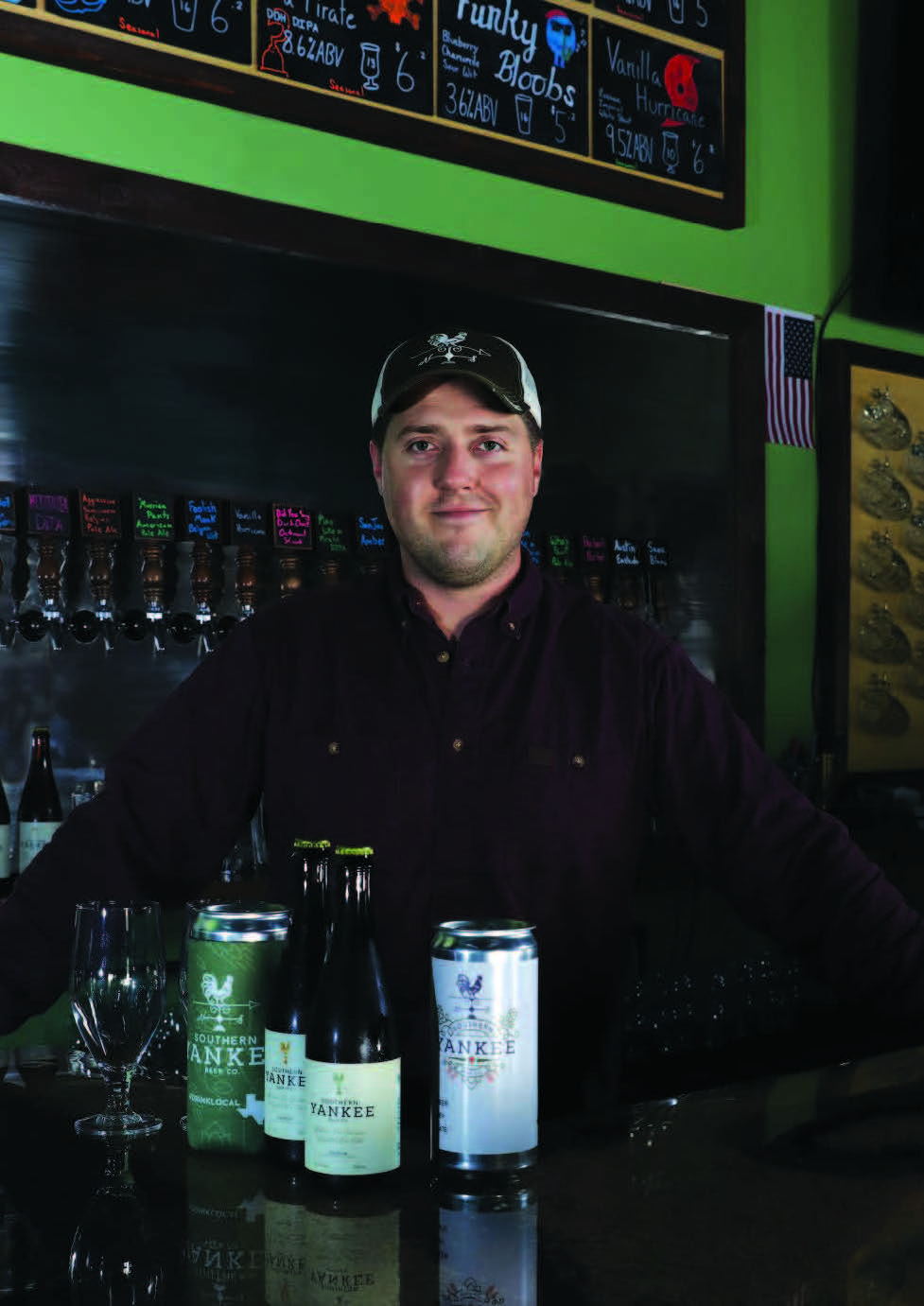 That was certainly the case for Alex Porter, MBA ’18, who left a career in oil and gas to get his MBA at Rice Business, then started a brewery with his family. He’s now the managing owner of Southern Yankee Beer Company in Spring, which opened last fall.
That was certainly the case for Alex Porter, MBA ’18, who left a career in oil and gas to get his MBA at Rice Business, then started a brewery with his family. He’s now the managing owner of Southern Yankee Beer Company in Spring, which opened last fall.
Porter spent eight years in oil and gas construction, traveling the world to far-flung destinations like Singapore and Australia and overseeing billion-dollar jobs. Although he enjoyed the work, ultimately he became frustrated with the way his company was managed. “The corporate culture was really poisonous,” Porter says. “There was a lack of independence. I needed to make a change.”
As a child, Porter had watched his father homebrew in their garage. Eventually, Porter pitched in, and he loved it. Around the time he started to feel disillusioned with his job, his sister, Sydney Porter, was graduating from college. “We sent her to brew school,” Porter says. Then, he enrolled at Rice Business with the goal of learning how to run a small business. During his second year in the MBA program, he was laid off.
“I thought to myself, ‘I can go recruit into some consulting job and save money for a brewery, or I can bootstrap it right now.’” He chose the latter.
Porter’s father invested in the brewery and works on strategic planning, while Sydney is brew master. The brewery broke even in its first month, Porter says, and became profitable shortly thereafter. Since then, they’ve added food service and additional employees, and they’re considering a second location. Porter works more hours now as an entrepreneur, and his take-home pay has shrunk, but he doesn’t mind.
“I’m making way less money, but I’m happier,” he says. “Working with family is great and getting to drink beer at work is nice.”
A corporate job might offer safety, Porter adds, but “with safety comes complacency.” He’s confident that in a few years he’ll have a pay scale similar to what he once had. “But it will all be from my own company,” Porter says. “I’m playing the long game.”
A more fulfilling career
 For alumna Susan Brown Snook ’85, leaving behind a career as a CPA to become an Episcopalian minister was less about parting with a stressful work environment and more about following her calling. She grew up in the Episcopal Church and was active in her local church throughout high school. In college, she studied English. At the time, she didn’t realize that becoming a minister was a career option, she says.
For alumna Susan Brown Snook ’85, leaving behind a career as a CPA to become an Episcopalian minister was less about parting with a stressful work environment and more about following her calling. She grew up in the Episcopal Church and was active in her local church throughout high school. In college, she studied English. At the time, she didn’t realize that becoming a minister was a career option, she says.
Her CPA career spanned a decade. “I worked hard and I was promoted early,” she says. “I was successful. But, I became conscious of not being happy. I wasn’t all that interested in what I was doing.” Having her first child was a wake-up call.
“It made me aware of a whole side of myself, my life, my hopes for my future that I had been neglecting when I was concentrating too hard on just being successful in my career,” says Snook.
So she started volunteering at her church, and then returned to school to get her Master of Divinity degree. She was ordained as a priest, and recently became the first woman to be elected Episcopal Bishop of San Diego.
“I get to call people together around a vision of transforming the world with God’s love, and that’s the meaning of life to me and what I love to do,” Snook says. “I’m still a successful, professional woman. I just moved into a field that’s more fulfilling to me.”
Smart business decisions
Alumni say their move to more personally fulfilling careers hasn’t come without some bumps in the road. They’ve had to shift their mindset and make lifestyle changes and sacrifices.
Cotto gave up frequent Door Dash orders from her favorite Peruvian restaurant and started preparing more meals at home. She parted ways with the Starbucks barista who knew her daily order by heart.
As a solopreneur, Cotto is in charge of every aspect of her business, from marketing to sales to invoicing, which can be tiring. “Entrepreneurship is not for the faint of heart,” she says. “It’s been an adjustment.”
Lessons learned at Rice Business have helped with that adjustment. For Cotto, it was the entrepreneurial classes she took. It’s been the same for Snook, who says an understanding of finance and accounting has been extremely useful for the work she’s done in the church. Cotto adds that for entrepreneurs pursuing their passion, it’s key to always treat the endeavor like a business.
Zhou says that many people start their own business with good intentions as they seek out greater flexibility and autonomy. But they also need to make sure they’re making smart business decisions, she says.
“You need to identify customer needs, create value for customers that other existing businesses cannot provide them with, and then you fill in the holes and create a profit,” Zhou says. “If a business is not successful, it’s even more stressful working for yourself. You still need to work hard.”
Lessons for employers
For employers, there are important lessons to learn from workers leaving corporate America. More companies must respect and nurture employee creativity, Zhou says, and realize that doing so will require a certain amount of risk taking.
“In general, workplaces are set up to be efficient,” Zhou says, “and they don’t encourage employees to express creativity. Companies need to adjust their expectations.”
A worker’s immediate supervisor plays a huge role. If he or she is inspiring and embraces creativity, that will trickle down to employees. If not, these leaders should be taught how to foster creativity, says Zhou.
These lessons haven’t been lost on corporate America. Companies like Google have started to embrace autonomy, giving employees time to pitch and work on their own projects. Zappos introduced a new self-management system, Holacracy, while Southwest Airlines encourages its employees to express themselves creatively. One video of a flight attendant rapping the plane’s safety information went viral.
Cotto says she’s hearing more and more of her clients, millennials especially, ask questions like “Am I happy at work? What is it that I really want?” and, “Is this job really helping me make a mark?” A lot of people simply stay where they are, unhappy, because they’re unaware of the options available to them, Cotto says. She asks clients to create a Pinterest board, pinning images that appeal to them, then looking for patterns and themes.
“I hear a lot of ‘shoulds’ with my clients,” she says. “People create an entire career on what their mom told them they should do because it’s a safe and secure job. Or, they don’t act on longings they’ve had.” For many, clues abound about what they really want to be doing — but those hints go unheeded. “Most of the time you’re just too busy to pay attention,” Cotto says.
Deborah Lynn Blumberg is a Houston-based freelance writer specializing in health and wellness and business and finance.
You May Also Like
Keep Exploring
Future Fitness
As the fitness market flexes new muscle, gyms are adapting to offer not just a workout, but a full-body wellness experience.


As the fitness market flexes new muscle, gyms are adapting to offer not just a workout, but a full-body wellness experience.
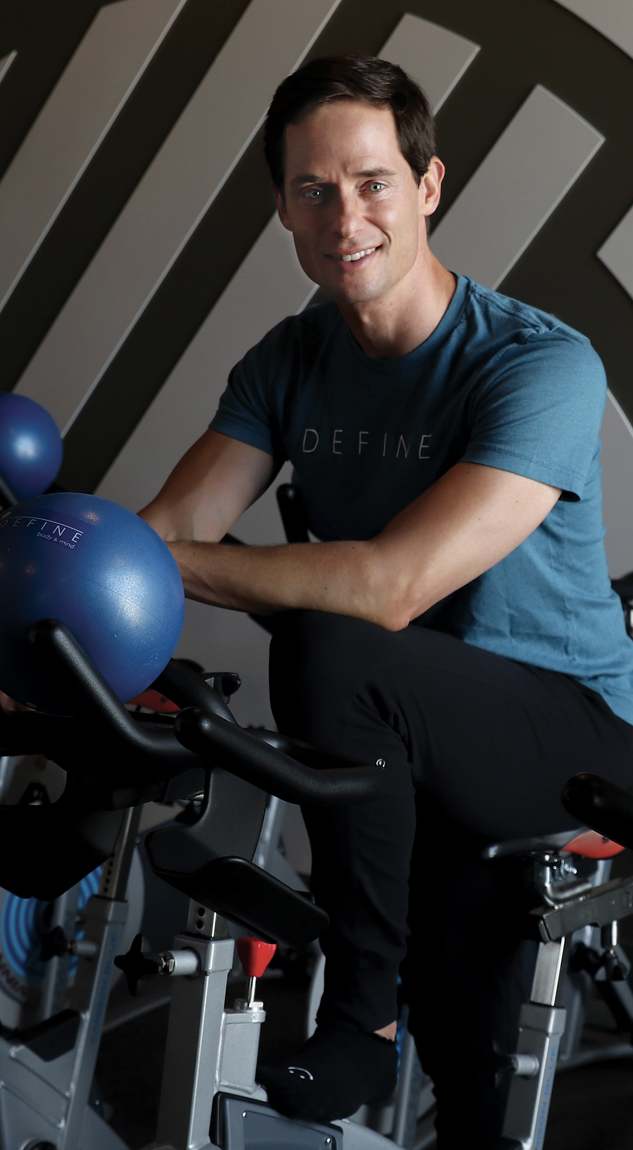 In a trendy Houston neighborhood, people in workout wear hurry past a restaurant serving locally sourced food, up the stairs of a boutique shopping center and into one of the city’s many high-end fitness studios. They are carrying babies.
In a trendy Houston neighborhood, people in workout wear hurry past a restaurant serving locally sourced food, up the stairs of a boutique shopping center and into one of the city’s many high-end fitness studios. They are carrying babies.
Breezing past the front desk of DEFINE Body & Mind, they enter a group workout room that feels more like a sanctum than a gym.
Other parents with babies strapped to their chests are already there, hoisting weights and flexing resistance bands.
“DEFINEbaby” is a class for moms and dads who want to break a sweat with their newborns. It’s also a testament to how deeply fitness has become ingrained into our lives. Workout classes have become so ubiquitous that children are now attending before they can even walk.
In 2019, the fitness industry is projected to hit a new high of roughly $36.5 billion in revenue, according to the market research group IBISWorld. This peak represents more than a decade of solid growth in fitness club memberships, which have risen by more than 33 percent since 2008.
Some analysts have speculated that the sustained expansion is due to rising health consciousness among younger people who were growing up as diagnoses of obesity, diabetes, and other health issues skyrocketed.
But Rice Business alum Henry Richardson, PMBA ’09, the founder of DEFINE, says the story is more complicated than that.
As he and other fitness entrepreneurs have noted, the entire culture of exercising has changed during the past decade. Gyms have gone from selling a membership to selling a lifestyle — logo athleisure wear included.
Exercising is no longer just about results, Richardson says. Increasingly, it’s also about finding a community.
He designed the DEFINE experience with that idea in mind, he says. The feeling of belonging is built in, from the welcoming, light-filled workout room to the lime body wash in the showers to the fact that the classes are designed for everyone, including pregnant women and seniors.
Data show that an elevated marketing and branding approach is working. Boutique studios like Richardson’s have seen the biggest boom of all sectors of the fitness industry in the last decade.
A Growing Market
 While cities like New York and L.A. have long been known for fashion-forward fitness, Houston has also proved to be a boomtown for boutique gyms.
While cities like New York and L.A. have long been known for fashion-forward fitness, Houston has also proved to be a boomtown for boutique gyms.
When Richardson moved back to his hometown from New York in 2007, Houston’s fitness landscape was so barren that you could conjure up an image of tumbleweeds to describe it. There was one lonely yoga studio in town.
Today, the city has made a 180-degree turn.
The luxury health club Equinox established a Houston outpost in 2015, taking up residency in the tony River Oaks District. And the high-end fitness chain Life Time, which opened its first facility here in 2004, now has nine in the greater Houston area — two of which opened in the past year. A Greenway Plaza location is scheduled to open later this year.
Meanwhile, Rice Business alum Molly Carter, MBA ’14, opened a boutique fitness studio, The Preserve, in River Oaks last year. Carter describes the gym as beautiful, upscale, and personal.
“I built the gym that I wanted to go to,” she said.
From the striking modern building, with glass walls to bring the natural world inside, to its futuristic “kinesis” cable-resistance machines, The Preserve is an homage to what Carter describes as a new national obsession with working out.
More than ever, word-of-mouth is what gets new people to walk through the door, she says, so she’s sought to create an experience so unique and appealing that when people leave, they want to tell others about it.
The presence of The Preserve in the Houston fitness market is one sign of how competitive — and potentially profitable — the region has become for exercise entrepreneurs. You can find another in a downtown high-rise where Gympass, a Brazilian company that moved to the United States two years ago, recently opened up an office.
Gympass, which bills itself as a fitness discovery platform, says it’s out to “defeat inactivity,” with a goal of getting the estimated 1.4 billion people who still don’t engage in physical activity off their couches.
It’s a lofty goal, but that’s what drew Rice Business alum Juan Castellanos, MBA ’16, to the company, where he’s now the global head of client operations. As someone who cares about health and fitness, he was intrigued by the fact that Gympass was trying to make exercise more accessible.
“We always think about fitness in these boxes. ‘Oh, I have to get a gym membership, I have to do this or that.’ That’s kind of the old model,” says Castellanos. The new model is more sophisticated, he says — it’s about helping people find an activity they actually enjoy.
Gympass offers its users, who are the employees of more than 2,000 companies that have purchased a membership plan, access to more than 900 different activities.
“How do you get people up? You give them different things to try. Even if you dislike traditional workouts, you can try 365 different things every day for a year to find something you might like,” Castellanos said.
A two-minute walk from one of the many spin studios in Houston, Gympass’ downtown office integrates elements of a workout facility: stacks of energy bars sit to the right of the reception desk, there are soccer balls and basketballs in a conference room, and inspirational quotes dot the walls.
Yet Gympass has a slightly different vibe than the gyms it partners with, humming with the energy of a start-up. Its sales staff target employers, not would-be members.
And they’re selling them a very different product: Buy a membership package with Gympass, which partners with workout facilities in Houston and around the world, and offer it as part of a benefit package to employees to improve recruitment and retention, increase productivity, and promote health and wellbeing.
Building Brand Strength
 Gympass is essentially a connector service, introducing people to the fitness communities that Richardson, whose franchise is one of the studios users can access through the platform, and others have created.
Gympass is essentially a connector service, introducing people to the fitness communities that Richardson, whose franchise is one of the studios users can access through the platform, and others have created.
Castellanos’ job is to make sure that their experience is seamless, whether they’re using the Gympass site to look up a class or to check in at a new gym they haven’t visited before.
That seems daunting when you consider that the company partners with more than 48,000 fitness facilities across the country and abroad. Yet it’s critical that amid innovation, companies provide consistency in order to maintain their customer base.
“It doesn’t matter where you go with Starbucks, you want to have the same cup of coffee,” Castellanos said. “Same with us. Our brand is still to defeat inactivity regardless of where you are.”
Building a strong brand identity will be key to long-term success in an increasingly competitive market, researchers say. Not only is the industry prone to being rocked by fads, with consumers lunging from Zumba classes one day to high-intensity interval training the next, but it is also competing against streaming services, the internet, and other entertainment businesses for slices of people’s free time.
Jaeyeon Chung, an associate professor of marketing at Rice Business, said researchers generally believe that companies who can get customers to “embrace the brand as an understanding of self” fare better year after year than those who don’t.
“People tend to choose products that represent their current self-image or their desired self-image,” she said. If you think you’re great at yoga, you buy high-end workout pants. Or if you want to be perceived as wealthy, you purchase a lower-priced item from Chanel.
That means companies such as DEFINE and Gympass must offer something that appeals to both people who perceive themselves as fit and those who want to get in better shape to continue to grow.
Community, accessibility, responsive customer service and product diversity — themes that Richardson and Castellanos both prioritize — are all elements that appeal to both types of customers.
Setting The Bar Higher
The challenge in the future, said Richardson, will be to continue to replicate the brand in new locations. DEFINE started with four studios in Houston; then Richardson decided to turn it into a franchise to grow the brand. Now there are studios in Austin, Colorado, South Dakota, and beyond.
“We are at a phase of the business where I want it to be the right group versus just to open up another store, and so consistency and quality is what fuels me,” he said.
More and more, expansion is likely to come on two fronts: internationally and virtually. According to researchers who track the industry, hedge funds are dumping large amounts of money into the sector to fund both the development of new fitness apps and the plumbing of different markets.
ClassPass, which allows people to try out workout classes at different gyms, recently announced it was expanding into Asia and the Middle East. And Peloton, an exercise equipment and virtual training company, has filed for an IPO.
Richardson is tacking in the same direction. In 2017, he helped a family friend launch the first international storefront for DEFINE in Dubai, and this summer he is getting ready to launch DEFINE online, which will offer live and taped classes to members.
Meanwhile Gympass, which is already in Latin America and Europe, announced in June it had netted a $300 million investment from SoftBank, a Japanese holding company, to expand into Asia.
Such rapid growth in an industry, however, raises the question of whether the fitness bubble is near bursting.
Richardson acknowledges that the industry could be reaching a tipping point, with too many types of studios in too many locations. On the other hand, he says, there still seems to be a large segment of the market who are just being introduced to new fitness concepts, and ready to give them a try.
If you ask Castellanos, anything could happen.
Fifty years ago, for example, no one guessed that a dancer named Judi Shepherd Missett, who launched Jazzercise in a basement, would go on to build a $2 billion company — nor did they think women would fuel a huge expansion in the fitness industry.
Castellanos hopes Gympass and other innovators will see similar success in reaching a new demographic: the more than 1 billion people who don’t work out at all.
“When you have a company like us that is literally redefining how people think about their lifestyle, or exercise, or level of activity,” he says, “why not?”
Hannah Sawyer is a writer in Houston.
Lifelong Learning
Devil In The Details
Can a few details transform your earnings forecast?


Based on research by Brian Rountree, Andrew B. Jackson and Marlene Plumlee
Can A Few Details Transform Your Earnings Forecast?
- A new, data-intensive technique can create a better profile of a firm and its profit forecast.
- Three firm-specific components — market, industry and idiosyncratic factors that are unique to a given firm — are enough to markedly improve the accuracy of a company’s profit forecasts.
- Investors can apply these more accurate projections to their calculations of a firm’s overall value.
Earnings summaries are the corporate version of a Magic 8 Ball, something used to forecast future performance and profit. But Rice Business professor Brian Rountree has found that magic has its limits, and that by delving into a few additional areas of interest, investors can get a more accurate prediction of a company’s future earnings than current techniques allow.
Plenty of studies analyze how to use performance summaries to calculate a firm’s potential and future profits. Building on the abundant literature around this approach, Rountree, working with colleagues Andrew B. Jackson of the UNSW Australia Business School and Marlene Plumlee of the University of Utah, devised a new, additional technique for forecasting profits. By dissecting an assortment of operating details, the researchers discovered, it’s possible to create a more precise forecast of a company’s financial future.
Rather than replacing prior work on the subject, Rountree’s team delved deeper into the significance of details within existing data. Their focus: whether including a firm’s market, its overall industry and any unique activity specific to the firm makes for a more reliable profit forecast. Their conclusion: Firms can indeed improve their predictions if they separate returns on net operating assets (RNOA) into separate components and use those figures in their projections.
Normally, firms use market and industry related data to create future profit predictions. For example, a major oil company might use data on market conditions and the overall state of the oil industry to build its profits prediction. The resulting financial literature might be peppered with statements such as, “Like the rest of big oil…” or “The overall market for oil remains soft.”
While this type of data is typically used to make projections, Rountree and his colleagues used the market and industry information more formally by creating the equivalent of stock return betas — a statistical measure of risk — for corporate earnings. In addition, they allowed for adding firm-specific information to market and industry information to help forecast earnings.
To conduct their study, Rountree’s team used Compustat quarterly data to calculate firm, industry and market RNOAs from 1976 to 2014. Next, they broke these figures down and separated the results into different categories.
Their resulting formula differs from the conventional approach because it doesn’t rely on one average set of market and industry-related data for each firm. Instead, it assumes varying factors for each company. The devil is in these details: Calculating specific market, industry and firm-idiosyncratic components improves the chances of forecasting profits correctly.
Correctly breaking down and separating profitability details to plug into the new formula is no small task. Separating company data into just three components requires up to 20 quarters of figures about prior profitability.
Once the information is processed, a researcher must then be vigilant for “noise” — incidental, irrelevant data that can lead to errors. Finally, Rountree warns, the breakdown process may not work as well for forecasting bankruptcy as it does for profits.
Used correctly, however, the technique is a practical new tool. By breaking down profitability into market, industry and firm-specific idiosyncrasies, researchers can improve forecasts strikingly compared to conventional calculations of total RNOAs.
The most accurate profit forecasts in other words, demand more than just a figurative shake of an industry Magic 8 Ball. To find the most reliable information about future earnings, a company instead has to flawlessly juggle years’ worth of specific details about their particular firm. But the reward of planning based on a correct forecast can pay for itself.
Brian Rountree is an associate professor of accounting at Jones Graduate School of Business at Rice University.
To learn more, please see: Jackson, A. B., Plumlee, M. A., & Rountree, B. R. (2018). Decomposing the market, industry, and firm components of profitability: Implications for forecasts of profitability. Review of Accounting Studies, 23, 1071-1095.
Never Miss A Story
You May Also Like
Keep Exploring
Test Waivers 101
What’s not to love about skipping the GMAT or the GRE? Here are some answers about the process: who’s eligible for a waiver, who’s most likely to get one – and above all, why you should think twice about seeking a waiver unless it’s absolutely necessary.
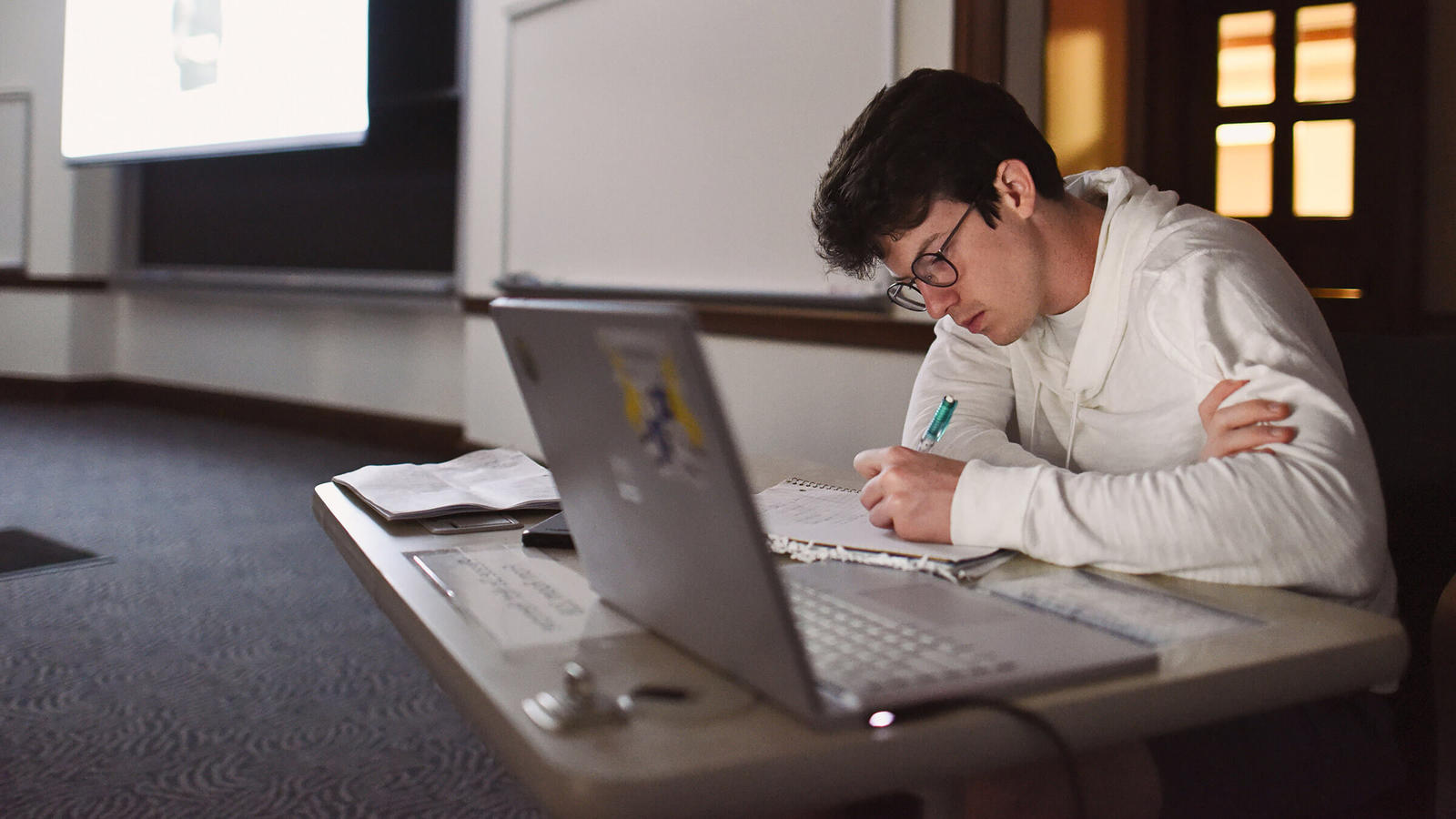
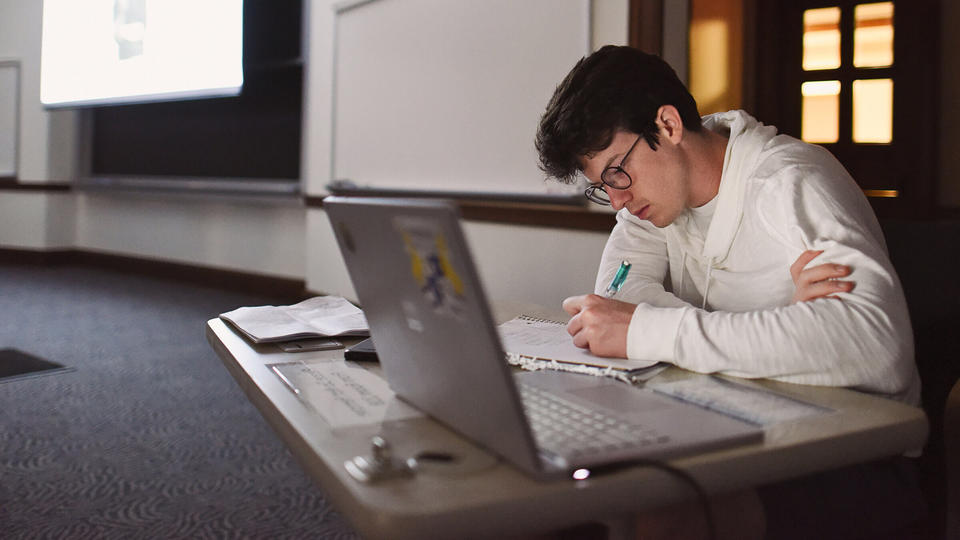
Updated from original post that was published on 8/6/2020.
If you’ve been checking our website recently, you’re not alone: this is a highly strategic time to earn an MBA! And you may have seen that we offer standardized test waivers. What’s not to love about skipping the GMAT or the GRE? Here are some answers about the process: who’s eligible for a waiver, who’s most likely to get one – and above all, why you should think twice about seeking a waiver unless it’s absolutely necessary.
I can’t stand standardized tests. Why are they required?
We know. Tests are a pain. But scores such as those from the GMAT and GRE show if you have the quantitative abilities to shine at Rice Business. And remember, even if you qualify for a waiver, you’ll have to make a compelling case for your skills in other ways. On the other hand, a test score in our range quickly and definitively says: yup, you’re Rice Business material.
Tests also show more than quantitative chops. It takes time, work and money to take a test. To us, this translates as commitment. Rice Business chooses – and rewards – committed learners.
Tests also do a lot more than help you get in. GMAT scores matter when we give out scholarships. And once it’s time to job-hunt, employers in industries like consulting and investment banking will ask for test scores, so you may need to take the test anyway. In other words, there’s no easy way out. Rice Business is fast-paced and rigorous – and so is the business world. Tests are an efficient way to show your strength.
Interested in Rice Business?
Do you look at waiver holders differently for MBA admissions?
No, we do not view applicants with test waivers differently. However, if you are approved for a waiver, your application package will contain one less component for evaluation. Be sure to include meaningful data, details, and information that will add value to the assessment of your application in lieu of a test score.
So what are the requirements to earn a waiver?
If you're applying to our MBA programs and want to be considered for a waiver, you need a minimum of three years of work experience and at least one of the following:
- A bachelor's or master's degree, with strong academic achievement in a STEM or quantitative subject area
- A terminal degree (e.g. MD or PhD)
- A quantitative professional certification (e.g. CPA, CFA)
- Other graduate level standardized test scores showing strong quantitative skills (e.g. MCAT)
Why should I know all this before seeking a waiver?
Because waivers are hard to get! And skipping a test now may not save you from having to take the exact same test later. We don’t want you to spend your time seeking a waiver when you could boost your chances of acceptance by taking a test. At Rice Business, we’re big believers that the harder you work, the luckier you’re going to get.
How to Apply for a Test Waiver
Full-Time MBA applicants:
You'll submit a standardized a standardized test waiver request in the Test Score section of your application. Waivers are only valid for the cycle they are approved in.
Professional and Hybrid MBA applicants:
We typically require test scores. If you meet our waiver requirements (such as a terminal degree, a master's degree or more than 3 years of work experience), you can explain that in your application and submit without a score. Keep in mind that the admissions committee may still request a test score after reviewing your application.
Executive MBA applicants:
No test score is required, but you can submit one if you have it.
